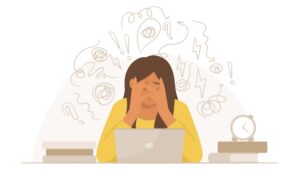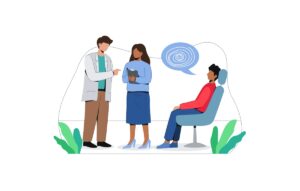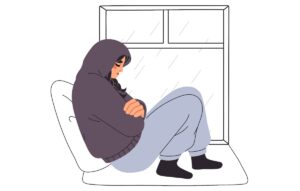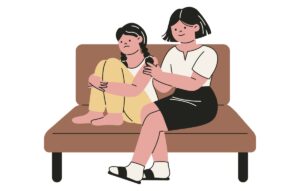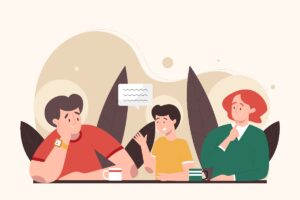Quick Summary
- Many people feel depressed during the holidays due to emotional pressure, comparison, grief, and seasonal changes — it’s more common than you think.
- If symptoms like hopelessness, exhaustion, or withdrawal last more than two weeks, it may be clinical depression that requires support.
- PRI’s PHP and IOP programs provide structured, compassionate care to help stabilize mood and regain balance during this emotionally intense season.
The holidays are often portrayed as a season of joy, celebrations, togetherness, gratitude, and tradition. But for many people, this time of year brings something very different: heaviness, loneliness, emotional exhaustion, or a sense of failing to feel happy when they’re “supposed to.”
If you’re wondering why you feel depressed during the holidays, you’re not alone — and you’re not doing anything wrong. This emotional disconnect is incredibly common, and it can be an important signal that you need support, rest, or a safe place to process what you’ve been carrying.
We will walk through why holiday depression happens, why it doesn’t mean anything is “wrong” with you, and what steps you can take if these feelings become overwhelming.
Why You May Feel Depressed When You’re Expected to Feel Happy
Depression during the holidays isn’t a personal failure. It’s a natural response to a complex mix of emotional, psychological, environmental, and social factors. Here are some of the most common reasons it happens even when your life “looks fine” from the outside.
Emotional Dissonance
When your internal experience doesn’t match external expectations — or what you believe you should feel — it can create shame, pressure, and emotional shutdown. The more you try to force happiness, the more the heaviness intensifies.
Comparison Overload
Holiday marketing, social media, and family expectations often create unrealistic standards for what the season “should” look like. Comparing your real life to curated versions of joy can make sadness feel sharper.
Hidden Stressors
The holidays bring unique emotional triggers, including:
- unresolved grief or anniversaries of loss
- conflict or tension with family
- financial strain
- pressure to attend social gatherings
- reminders of loneliness or disconnection
When these stressors build, depression can deepen quickly.
How Frequent Moves Impact Emotional Development
Each move does more than change a postal code. For children and adolescents, relocation disrupts fundamental developmental processes.
Frequent moves can create:
- Loss of stability: Home, friendships, and routines reset each time.
- Loss of control: Moves often occur without the child’s input, creating helplessness.
- Unresolved grief: Goodbyes pile up without closure.
- Adaptation fatigue: Constantly analyzing norms, language, and social expectations strains emotional bandwidth.
- Interrupted development: Identity formation, belonging, and friendships restart repeatedly.
Some teens internalize these transitions as exploration. Others internalize them as instability or emotional loss. Both experiences are valid.
Seasonal and Biological Factors
Reduced sunlight, colder weather, and disrupted routines can contribute to seasonal depression or amplify existing symptoms. Alcohol — which is more widely used during the holidays — can also intensify sadness, irritability, or hopelessness.
If you feel depressed during a season associated with joy, it doesn’t mean you’re ungrateful. It means you’re human.
Signs Your Holiday Sadness Might Actually Be Depression
Feeling overwhelmed during the holidays is common. But certain symptoms may signal a deeper level of distress that deserves attention.
You may be experiencing depression if you notice:
- loss of interest in activities you normally enjoy
- persistent sadness, irritability, or emotional numbness
- sleeping too much or too little
- withdrawing from family or friends
- struggling to complete daily tasks
- increased alcohol use to cope
- feelings of guilt, worthlessness, or hopelessness
- difficulty getting out of bed
- crying spells or unexplained emotional waves
If these symptoms last more than two weeks — or feel heavier than usual — this may be a sign that you need structured support.
You’re not supposed to manage this alone. Help is available.
Joint Commission Accreditation, DHCS License,
& Clinical Partnership with CPCMG
Joint Commission Accreditation, DHCS License, & Clinical Partnership with CPCMG
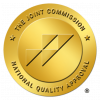



In Clinical Partnership With
PRI Treatment Center is proud to clinically partner with Children’s Primary Care Medical Group San Diego to expand access to high-quality mental health services. Together, we’re bridging the gap between primary care and mental health to better support the well-being of children and families in our shared community.
Common Triggers That Intensify Depression This Time of Year
The holidays tend to shine a spotlight on areas of life that hurt or haven’t been processed yet.
1. Loneliness or Feeling Disconnected
You can be surrounded by people and still feel incredibly alone. Emotional disconnection is one of the strongest predictors of holiday depression.
2. Grief and Loss
Holidays without loved ones, anniversaries of loss, or memories of past seasons can bring grief to the surface sharply.
3. Family Conflict or Tension
Gatherings can be stressful if relationships are strained, communication patterns feel unsafe, or past trauma resurfaces.
4. Financial Pressure
Gifts, travel, and year-end expenses can create financial anxiety, adding stress to an already emotional season.
5. End-of-Year Emotional Burnout
When you’ve been “holding it together” all year, the holidays can be the moment your mind and body finally let down their guard, causing a crash.
Understanding your triggers doesn’t solve everything, but it can help you see the bigger picture: what you’re feeling has a reason.
What to Know
- You’re not “supposed” to feel happy, you’re supposed to feel supported.
Holiday depression is valid and often tied to real emotional triggers. - Symptoms that last 2+ weeks may signal a deeper level of depression.
Numbness, irritability, withdrawal, sleep changes, and hopelessness deserve attention. - Help is available immediately.
PRI offers structured PHP and flexible IOP to help you regain stability during a season when emotions often intensify.
What You Can Do Right Now to Feel More Grounded
You don’t have to wait until the holidays are over to feel better. Even small changes can create relief.
Acknowledge What You’re Feeling
Judging your emotions won’t make them lighter. Naming your sadness or frustration can reduce the pressure you’re placing on yourself.
Set Boundaries
You don’t need to attend every event or meet every expectation. It’s okay to say no, limit conversations, or take space when you need it.
Maintain Gentle Routines
Regular sleep, meals, hydration, and movement support your mood more than you might realize.
Limit Alcohol
Alcohol can deepen depression and overwhelm, even in small amounts. Reducing consumption can help stabilize your mood.
Reach Out to One Safe Person
Connection, even a brief one, can break cycles of isolation.
Use Grounding Skills
Breathing exercises, mindfulness, and slow sensory grounding can help regulate your nervous system during emotional spikes.
These tools are not meant to “fix” everything; they’re meant to support you until you feel ready for the next step.
When to Seek Professional Support
There’s nothing wrong with needing more help, especially during a season that intensifies emotions for so many people.
You may benefit from professional support if you notice:
- symptoms lasting longer than two weeks
- difficulty functioning at work, school, or home
- increasing isolation
- worsening anxiety or panic
- using alcohol to numb or escape
- thoughts of hopelessness
- significant changes in energy or mood
If these experiences sound familiar, treatment can provide structure, stability, and a pathway forward — especially during the holidays when emotional overwhelm peaks.
How PHP and IOP Help Stabilize Holiday Depression
PRI Treatment Center offers two levels of care designed to support individuals who feel overwhelmed, depleted, or emotionally stuck during the holidays.
Partial Hospitalization Program (PHP)
PHP provides a structured, therapeutic environment during the day for people who need more support than weekly therapy can offer. It includes:
- daily therapeutic groups
- individual sessions
- medication management (as needed)
- crisis stabilization
- coping skill development
PHP can help you regain stability quickly in a safe, supportive setting.
Intensive Outpatient Program (IOP)
IOP offers clinical support while allowing you to maintain work, family responsibilities, or school. It includes:
- 3–5 days per week of therapy
- evening or daytime flexibility
- relapse prevention
- emotion regulation skills
- support for co-occurring anxiety or trauma
IOP can be especially helpful if you’re still functioning day-to-day but feeling increasingly overwhelmed.
You don’t have to wait until after the holidays to get help. The right level of care can meet you where you are, right now.
You Deserve Support This Season and Beyond
Feeling depressed during the holidays doesn’t mean you’re ungrateful or broken. It means you’re carrying something heavy, and your mind and body need support.
If this season is overwhelming, you don’t have to navigate it alone.
PRI Treatment Center offers confidential, compassionate care.
If you’re ready to talk to someone who understands, we’re here.
📞 Call Now for Support or send a private message. We’ll help you figure out the next step that feels right for you.
Frequently Asked Questions
Is it normal to feel depressed during the holidays?
Yes. Many people experience depression during the holidays due to emotional pressure, comparison, grief, family stress, and seasonal changes. Feeling misaligned with holiday expectations is extremely common and does not mean something is wrong with you.
Why do I feel sad when I’m supposed to feel happy?
Emotional dissonance, unresolved stress, seasonal depression, burnout, and social comparison can create sadness during a season associated with joy. This emotional mismatch often intensifies feelings of guilt or shame.
How do I know if my holiday sadness is actually depression?
If symptoms like hopelessness, fatigue, isolation, loss of interest, or sleep changes last longer than two weeks or impact your functioning, your holiday sadness may be clinical depression. Professional support can help you stabilize and feel more grounded.
When should I get help for depression during the holidays?
If your symptoms intensify, you feel unable to cope, you are withdrawing from others, or you notice increased alcohol use, it's time to seek help. PRI’s PHP and IOP programs offer confidential support during this seasonal period of emotional overwhelm.
Can PHP or IOP help with holiday-related depression?
Yes. PHP provides daily therapeutic structure for acute symptoms, while IOP offers flexible support for individuals balancing treatment with work or family. Both levels of care help stabilize mood, teach coping skills, and reduce the intensity of holiday depression.

Dr. Warter received his doctorate in Clinical Psychology from The Wright Institute in Berkely, California, completed his Predoctoral Internship at USC’s Children’s Hospital Los Angeles, and was a Postdoctoral Researcher at USC’s Institute for Integrative Health and Wellness. Dr. Warter has also been trained at UCSF School of Medicine, Kaiser Permanente, and in community clinics in rural, underserved communities in Argentina and Paraguay. Dr. Warter has received training in providing parents with guidelines to help prevent behavior problems and enhance communication skills and strategies to promote children’s social, emotional, and academic competence. Dr. Warter has also published and presented at the University of Naples and the University of Buenos Aires on subjects related to Third Culture Kids and the impacts of Social Media on Personality and Self Esteem.

